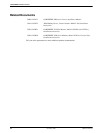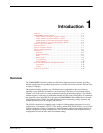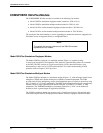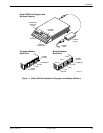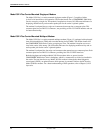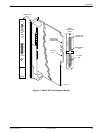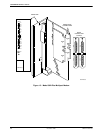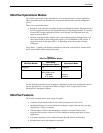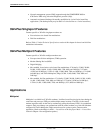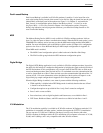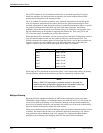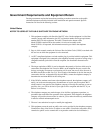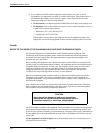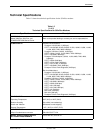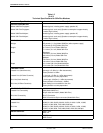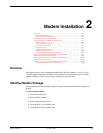
COMSPHERE 392xPlus Modems
1-8 November 1996 3920-A2-GN31-30
• Network management system (NMS) support through the COMSPHERE 6800 or
6700 Series NMS using Advanced Diagnostic protocol (ADp).
• Automatic and manual backup with standby capabilities for 4-wire/2-wire leased-line
applications. (The backup facility may be either a 2-wire dial line or a 2-wire leased line.)
392x
Plus
Singleport Features
Features specific to 392xPlus singleport modems are:
• Four-wire/two-wire leased-line modulations.
• Dial-line modulations.
Refer to Table 1-2 in the T
echnical Specifications
section of this chapter for leased- and dial-line
modulations information.
392x
Plus
Multiport Features
Features specific to 392xPlus multiport modems are:
• Four-port time division multiplexer (TDM) operation.
• Modem Sharing Device (MSD).
• Digital Bridging.
• Mux enabled, four-wire/two-wire leased-line modulations: V.34 family (33,600, 28,800,
24,000, 19,200, 16,800, 14,400, 12,000, 9600, 7200, 4800, and 2400 bps), V.32 terbo
(19,200 and 16,800 bps), V.32bis (14,400, 12,000, 9600, 7200, and 4800 bps), V.32 (9600
and 4800 bps), and Trellis Multipoint (TMp) (19,200, 14,400, 9600, 7200, 4800, and
2400 bps).
• Mux enabled, dial-line modulations: V.34 family (33,600, 28,800, 24,000, 19,200, 16,800,
14,400, 12,000, 9600, 7200, 4800, and 2400 bps), V.32 terbo (19,200 and 16,800 bps),
V.32bis (14,400, 12,000, 9600, 7200, and 4800 bps), V.32 (9600 and 4800 bps).
Applications
Multipoint
Multipoint
is available in all 392x
Plus modems. It utilizes leased-line circuits for time sharing the
same front-end processor (FEP) port with multiple remote locations. The FEP (via the control
modem) regulates traffic on the line by continuously polling the tributary DTE(s) in a predefined
sequence. Only one tributary can communicate with the control modem at a given time. Modems
configured for Trellis Multipoint (TMp) cannot be used in a point-to-point, constant carrier
application. (Refer to the Multiport Mode —
Leased Line
or the
Singleport Mode —
Leased Line
section in Chapter 4 for configuration options.)



